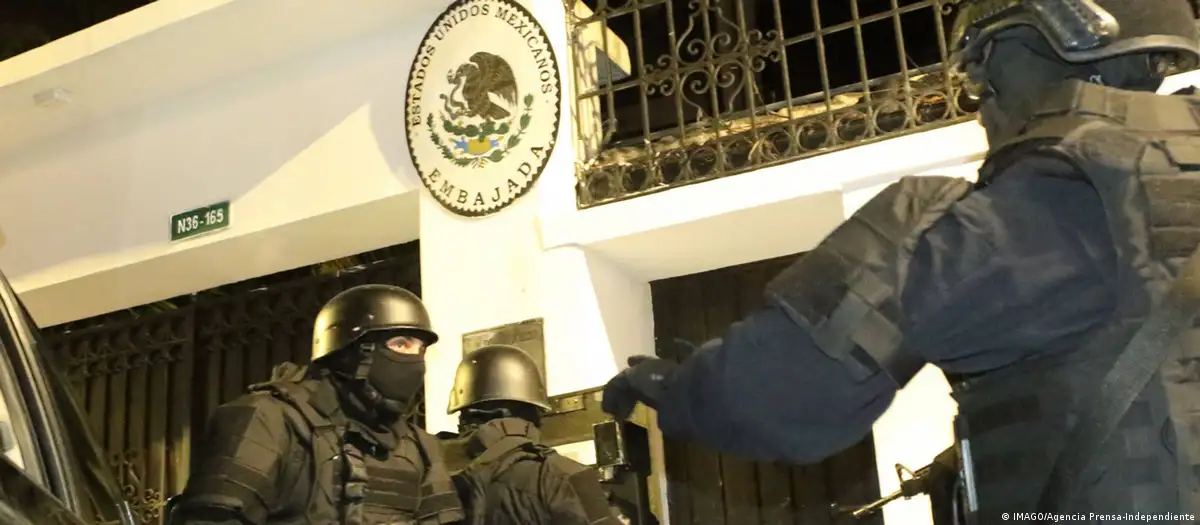Foreign diplomatic representations are inviolable under international law – it is on this basis that embassies provide protection to citizens who fear unjust persecution.
(DW) By authorizing a police raid on the Mexican embassy in Quito to arrest former Ecuadorian vice-president Jorge Glas, the Ecuadorean government has not only staged one of the most unusual scenes in the modern history of international relations, it has also violated one of the most basic principles of international law: the inviolability of a foreign diplomatic mission.
The episode, which could lead to a case before the International Court of Justice, sparked a wave of international indignation and a reprimand from the Secretary General of the United Nations (UN), Antonio Guterres, for whom the case “threatens the search for normal international relations”.
The invasion of the embassy took place last Friday (April 5), hours after Mexico had granted political asylum to Glas, who had been a refugee there since December 17, and led to the breakdown of relations between the two countries.
A former vice-president of Ecuador during the government of leftist Rafael Correa (2007-2017), Glas was sentenced to six years in prison for receiving bribes from Odebrecht and had an arrest warrant issued against him for embezzling public funds.
What international law says
Article 22 of the Vienna Convention on Diplomatic Relations states that countries have the duty to “adopt all appropriate measures” to protect accredited diplomatic missions from “any intrusion or damage”, as well as from “disturbance of the peace of the mission or injury to its dignity”. The provision was ratified by Ecuador in 1964.
It is on the basis of this convention that embassies provide protection to citizens who would otherwise be arrested by a country’s authorities, or who fear such a risk.
Recent history is full of cases of political personalities who, like Glasner, have taken refuge in embassies. Here are a few controversial cases.
Jair Bolsonaro
In an apparent attempt to obtain refuge and avoid a possible arrest order, former president Jair Bolsonaro spent two days in the Hungarian embassy in Brasilia in February this year, after having his passport confiscated by the Federal Police (PF). The case only came to light more than a month later in a New York Times report.
Bolsonaro, who is under investigation for his suspected involvement in a coup attempt to keep him in power after his defeat in the 2022 elections, denies that he wanted to seek asylum. When asked about the case, he said that he maintains “friendship with some heads of state around the world” and that he talks to them about “matters of interest to our country”.
Julian Assange
Wanted by the United States for divulging confidential information between 2010 and 2011 about the country’s military actions in the Middle East, activist and WikiLeaks founder Julian Assange lived for seven years in the Ecuadorian embassy in London.
The Swedish authorities had issued an arrest warrant for him in 2010, accusing him of sexual abuse, and in 2012 the UK courts decided to authorize his extradition to Sweden. Ecuador’s president at the time, Rafael Correa, who supported WikiLeaks, granted Assange asylum.
In 2019, however, the Ecuadorian government revoked the measure and ordered him to leave the embassy. The case against him in Sweden was eventually dropped, but he has been in prison since 2020 pending possible extradition to the United States.
Roger Pinto Molina
Opponent of the government of Bolivia’s Evo Morales, former senator Roger Pinto Molina went into exile at the Brazilian embassy in La Paz in 2012, where he stayed for more than a year after being accused, among other things, of being the mastermind of an action in 2008 that resulted in the deaths of 20 indigenous people.
Molina ended up fleeing by car in 2013, aided by a Brazilian diplomat. His escape infuriated the Morales government and embarrassed the government of then-president Dilma Rousseff.
The former senator, who settled in Brazil, died in 2017 after the plane he was piloting crashed in Goiás.
The diplomat who helped him escape was suspended from Itamaraty for 20 days, but was promoted to the highest career post in 2016, during the Michel Temer government.
ra (ots) *** Translated by DEFCONPress FYI Team ***
